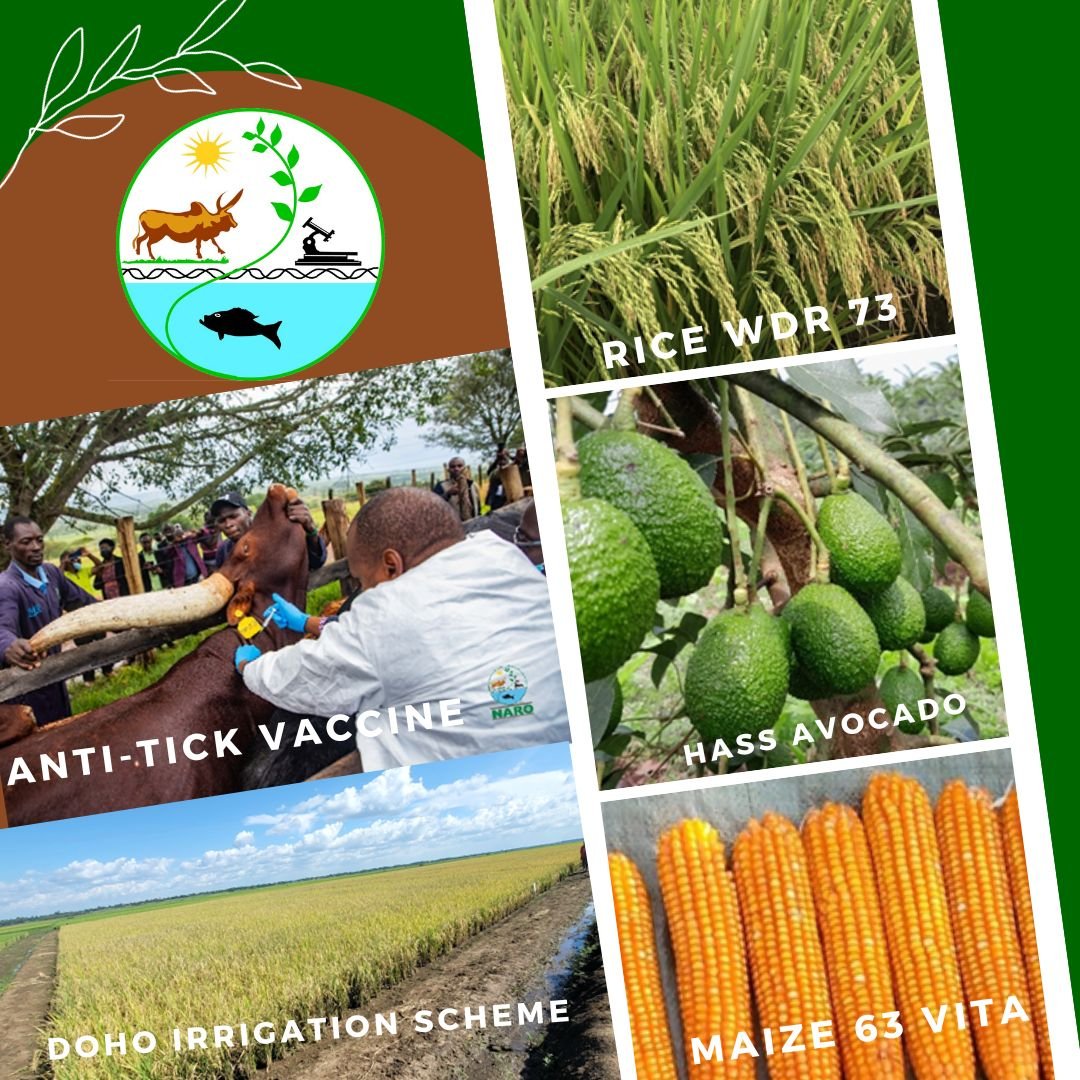Over the last 32 years, the National Agricultural Research Organisation (NARO) has been at the fore front of Agricultural research and innovations, with outstanding contributions towards food and nutrition security, improved household incomes and economic growth in the country, while ensuring environmental sustainability. Guided by a Governing Council and managed by a Secretariat, NARO functions through 16 Public Agricultural Research Institutes (PARIs) strategically located across the country. NARO is presently executing a 5-year strategic plan (2020/21-2025/26). This plan is aligned with the National Development Plan (NDP III) and the NRM Manifesto 2021-2026, all working towards improving the quality of life through agricultural sector transformation.
Transformative and game-changing research technologies and innovations
With a strong strategic focus on commercialization, NARO conducts market-led and adaptive research in all sectors of crops, livestock, fish, forestry, and cross-cutting impact areas. Over the last 13 years, NARO has developed and promoted over 800 Technologies, Innovations, and Management Practices (TIMPs) for increased agricultural production and productivity, improve post-harvest handling and food safety, food and nutrition security, value addition, agro-industrialization and sustainable natural resource management.
NARO plays a crucial role in diversifying agricultural output to tackle climate-related challenges and productivity constraints in the country. This contributes to enhancing the competitiveness of agricultural products in regional and international markets, promoting value addition for increased household income, and generating employment across commodity value chains.
In the crop sector, recent releases include specialty varieties tailored to specific market segments. Notably, high vitamin A varieties have been introduced to boost nutrition and create value-added food and feed products. Striga-resistant varieties have also been developed in response to the widespread Striga infestation. Other notable releases comprise aromatic and market-class rice varieties (NARORICE 1 and 2), two potato varieties designed for industrial purposes (crisps and chips), and culinary qualities. Additionally, sweet potato varieties (NAROSPOT 6 and NAROSPOT 7) exhibit versatility for both food and confectionery industries, resulting in a significant reduction in wheat usage by up to 60%.
Ongoing research endeavors show promise in testing mid-altitude wheat to meet the substantial demand for wheat, which is predominantly imported. Other recent crop releases include: two maize varieties, twelve vegetable varieties, two potato varieties, two varieties of green gram, two ground nut varieties, two cotton varieties, and two sorghum varieties. The organisation also released one forage variety (NARO Lablab 1).
Strengthening the Coffee Industry:
Over the last ten years, NARO developed 10 coffee wilt disease-resistant varieties with capacity to yield 3.9 tons/ha, outperforming susceptible varieties at 1.5 tons/ha. The adoption of these resilient, high-yielding varieties and climate-smart practices led to increased coffee productivity and exports, reaching 5.06 million bags in 2019/20 valued at USD 494 million, up from 2.7 million bags in 2006/07. In addition Wilt resistant varieties, NARO has developed diverse innovations to tackle threats to crop productivity such as the Black Coffee Tweak Borer, soil fertility decline, and biofertilizers and Liquid Nitrogen fertilizer to alleviate high cost of nitrogen fertilizers.
Increasing sustainable rice production
NARO has released high-yielding, adapted and consumer-preferred rice varieties of the three ecologies of upland, irrigated and rain fed lowland. Over the last decade, rice production in Uganda increased at an average annual rate of 7.33%. To date, over 18 superior rice varieties have been released and are commercially produced and consumed. The increased rice variety turnover and adoption has boosted rice productivity from the national average of 1.2 tons/ha to 2.2 tons/ha, resulting in increased production from 325,000 MT in 2016 to 350,000 MT in 2019. At the same time, rice importation decreased from 90,000 MT to less than 40,000 MT, saving the country over UGX 100 billion. These varieties also spurred the growth of significant rice milling companies, generating employment locally and boosting foreign exchange through exports.
Combating malnutrition and hidden hunger:
Uganda is. NARO made tremendous progress in crop bio-fortification (nutrient-enrichment) of major staples to sustainably combat malnutrition and hidden hunger, a constraint costing the country an estimated US$ 899 (5.6% GDP) million annually due to the effects of malnutrition and poor health among the workforce. NARO have released and disseminated Vitamin-A-rich orange-fleshed sweet potatoes and maize, and beans rich in iron and zinc. Further effort has been invested in developing purple-fleshed sweet potato rich in antioxidants, pro-vitamin A-rich oranges and bananas, yellow cassava, and black rice rich in anti-oxidants.
Livestock productivity:
NARO has advanced local agriculture by introducing high-yield, nutrient-rich, and drought-resistant pastures, boosting local milk production from 2.6 to 6.7 litres/day/animal and reducing time to reach a 400 kg market weight from 7 to 4 years. The newly launched NARO LABLAB 1, with high protein content, aims to replace costly soybean in livestock feed. Additionally, NARO introduced the resilient Viking Jersey cattle breed, capable of producing 20-25 litres/day when well-fed. Through in-vitro fertilization, the breed can yield 1000 embryos annually for surrogate implantation. NARO’s dairy “Zero Waste” circular system has numerous benefits, including bio acaricide, an anti-tick vaccine, and progress toward a vaccine facility for tick-borne diseases, Foot and Mouth Disease (FMD), and African swine fever. Other innovations encompass an African swine fever diagnostic kit, an incubator from locally sourced materials for hatching chicken eggs, and feed supplements from diatomaceous earth to counter slow growth in pigs and chickens due to intestinal worms.
Sustainable fish production initiatives
NARO has generated and disseminated production-enhancing technologies in fisheries and aquaculture, focusing on tilapia genetic improvement, fish fingerling production, feed development, and a Freshwater biodiversity portal. NARO resolved a hindrance to fish breeding by acquiring a floating feed production line. NARO applied a biological control agent, Cyrtobagous salviniae, and effectively managed the Kariba Weed that had devastated fish production systems, especially in the Kyoga Lake Basin. The successful control of this weed has allowed unrestricted fishing, water transport, recreation, cage culture and various water-related activities in once-infested areas.
Over the years, NARO has led the adoption of cage and pond fish farming technologies, enhancing Nile tilapia growth rate from 0.52g/day to 2.47g/day. Large-scale application of best management practices, along with the production of 377,930 fast-growing fish fingerlings, supported pond and cage farming, contributing to an increase in annual farmed fish production from 95,000 metric tons in 2010 to 120,000 metric tons in 2017, valued at UGX 1.8 billion annually. NARO’s establishment of management practices on Lake Victoria led to a 38% recovery of Nile perch stocks, rising from 267,187 tons in 2017 to 370,345 tons in 2019. These efforts resulted in increased fish exports from 14,248 MT valued at USD 136 million in 2017 to 20,364 MT valued at USD 153.4 million in 2019.
Growing the Maize Industry:
Maize plays a crucial role in the national economy in providing employment along its value chain, household income, and revenue from significant exports. Approximately 3.6 million households (mainly smallholders) grow maize on more than 1.9 M ha (about 20% of the total crop area). Over the past 15 years, maize production and productivity have almost doubled, with gains arising mainly from increased adoption of improved varieties, expansion in the area, emerging commercial farmers, increased access to improved seed, and favourable grain policies. Over the past 15 years, NARO released over twenty stress-resilient maize hybrid varieties, yielding 8–10 tons/ha, addressing climate change and other production challenges. Increased varietal turnover and adoption of these improved varieties has led to increased investment in over 30 private seed companies supplying improved seed to over 3.6 million households (mainly smallholders) growing maize on more than 1.9 million ha and producing 4.6 million tons annually. This increase in production and productivity elevated maize export earnings from $95.91 million (Shs348 billion) in 2017 to $106.81 million (Shs389 billion) in 2018. This increased maize production and productivity has been realized despite the outbreaks of pests and diseases such as fall armyworm in 2016 and maize lethal necrosis in 2012, limited fertilizer use and volatility in grain prices.
Forestry and Agroforestry Innovations:
Recognizing the vital role of forestry in climate resilience and livelihood improvement, NARO has focused on conducting research on commercially valuable tree species, fast-growing timber species, and the potential of Shea tree, Hass avocado, Macadamia, Cashew nut and Bamboo. Efforts to address Uganda’s timber deficit involves scaling up and diversifying species like Melia volkensii commonly known Giant Lira, Olea welwitschii, and Gmelina arborea. Fast-growing bamboo has been explored as a wood substitute to generate raw materials for pulp and paper production, thereby reducing the $162 million paper import costs. NARO has also promoted climate-resilient communities through agroforestry, energy-efficient stoves that use 70-80% less fuel than traditional stoves hence curbing deforestation, and promoting off site conservation through an arboretum (botanical garden devoted to trees). NARO is further bioprospecting the pharmaceutical potential in Uganda’s trees to underscore the importance of conserving forests for healthy livelihoods.
Other value-added products that have been innovated include: Bamboo charcoal, Briquettes, Shea butter nut jam, Liquid soap, Shea butter soap, Shea butter jelly, Shea butter juice, Shea butter nut wine, and several antibiotic drugs. Notably, NARO has developed an antidiabetic drug trade-marked KAV400 from woody plant species, aiming to address the rising prevalence of diabetes. Diabetes Mellitus (DM) is a metabolic disorder, and in Uganda, the prevalence rate increased from 2.8% in 2011 to 4% in 2021. Over the past decade, diabetes-related deaths in Uganda have more than doubled, rising from 1,057 in 2011 to 10,416 in 2021. Type 2 DM, linked to insulin deficiency or ineffective production, is escalating in developing countries, and its conventional treatment using synthetic agents often leads to severe side effects. Drawing from the success of herbal remedies like covidex during the COVID-19 pandemic, NARO explored the medicinal potential of indigenous trees for managing chronic diseases like diabetes. The resulting drug, trademarked as KAV400, has demonstrated efficacy and safety in controlling diabetes in adults, with ongoing registration under the National Drug Authority.
Cassava production
NARO introduced and spread six high-yielding varieties resistant to Cassava Mosaic Virus disease (CMD) and Cassava Brown Streak Virus disease (CBSD), crucial for communities heavily reliant on cassava. These varieties not only restored cassava production but also propelled Uganda to the sixth-largest cassava producer in Africa. With five new factories utilizing cassava for ethanol, starch, high-quality cassava flour, and beer brewing, cassava is increasingly replacing wheat and maize, with an import substitution value of USD 30.7 million. The expanding factories generate employment and create a market along the value chain. Investments in cassava research contributed to a rise in production from 2,728,988 MT in 2016 to 2,819,327 MT in 2018 (UBOS, 2019).
Quality Assurance in Value-Addition:
NARO has extended its frontiers to the development and promotion of value-added products with the release of eleven (11) agro-machinery prototypes including; a hydraulic ram pump, rice thresher, forage chopper, and a commercial food-grade fish smoking kiln. The fish smoking kiln processes high-quality smoked fish, reducing cancer-causing compounds from 40,000 ppb to a safe level of 0.88 ppb—well below the 2 ppb limit set by international markets like the EU and USA. This initiative is supporting smoked fish processing SMEs, expected to create employment, particularly for women and youth. The NARORAMP-2 hydraulic ram pump increased vegetable cropping frequency from two to three times per year (48.5-51% annual yield increment). The rice thresher reduced grain losses during threshing from 4.8% to 0.1%.
NARO is at advanced stages of establishing critical infrastructure, including Agricultural Engineering Research Facilities at Namalere, AflaSafe facilities at Namulonge to manage Aflatoxins, and a multipurpose laboratory at Kituza to address challenges in the coffee and cocoa value chains, ensuring productivity and quality for diverse markets.
Over the past two years, NARO has actively pursued the development of numerous value-added product prototypes including Coffee powder, Coffee cake, Coffee yogurt, Coffee scrub, Coffee lotion, Coffee aftershave, Cocoa lotion, Cassava starch, Biodegradable paper from cassava peel, Maize puffed snack, sweet potato flour, and Sorghum and millet beer, beverage, porridge, as well as 10 different products from greengram, among others.
By shaping the agricultural landscape, addressing economic vulnerabilities, bolstering food security, and advocating for sustainable practices, NARO plays a pivotal role in advancing the stability and prosperity of Uganda, thus contributing to the nation’s liberation.

















